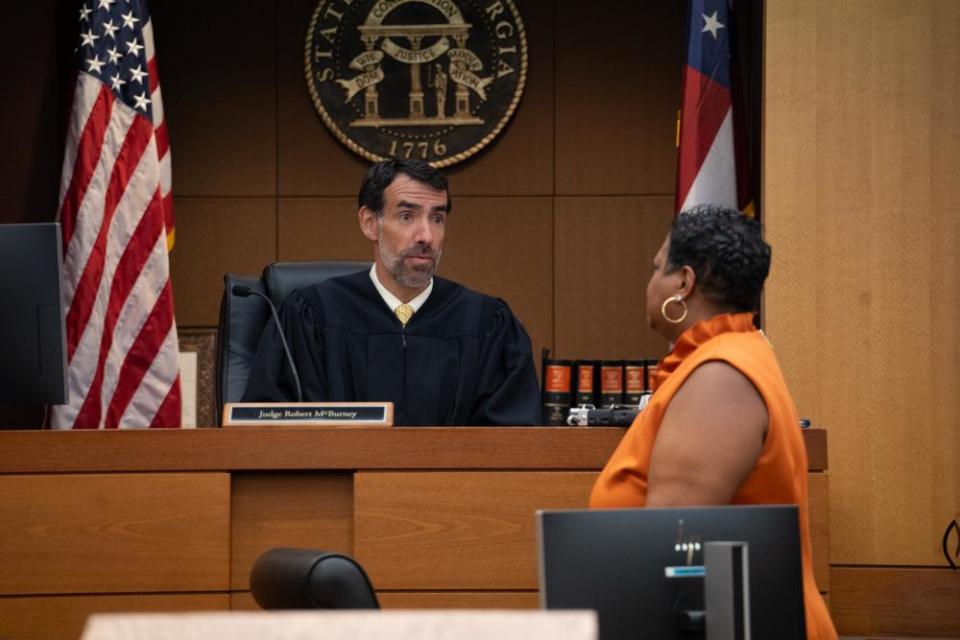Donald Trump and allies indicted in Georgia over bid to reverse 2020 election loss
- Oops!Something went wrong.Please try again later.
- Oops!Something went wrong.Please try again later.
- Oops!Something went wrong.Please try again later.
Donald Trump and some of his closest confidants have been indicted on state racketeering and conspiracy charges over efforts to reverse Trump’s defeat in the 2020 election in Georgia. This indictment makes the former US president a criminal defendant in a fourth case as he campaigns to recapture the presidency.
The sprawling 41-count indictment, handed down by a state grand jury in Atlanta late on Monday night, charges Trump himself with 13 counts and accuses him of orchestrating a criminal enterprise.
In addition to Trump, prosecutors in the office of the Fulton county district attorney, Fani Willis, charged 18 other defendants, including his former White House chief of staff Mark Meadows as well as his 2020 election lawyers Rudy Giuliani, Sidney Powell, Jenna Ellis and Kenneth Chesebro.
The charges mark a moment of significant legal peril for Trump, since the charges come at the state level and he would not be able to undo any potential convictions through measures such as a self-pardon or appointing a sympathetic attorney general if he were re-elected president in 2024.
Related: Trump’s Georgia charges are a win for voting rights leaders
In a statement after the indictment was issued, Trump’s legal team said “the events that have unfolded today have been shocking and absurd, starting with the leak of a presumed and premature indictment before the witnesses had testified or the grand jurors had deliberated and ending with the district attorney being unable to offer any explanation.”
In recent months, the district attorney’s office identified multiple general and state election law violations by Trump and Republican operatives as they sought to subvert the 2020 election, from pressuring state officials to organizing fake slates of electors to breaching voting machines.
The prosecutors examined whether there was scope to construct racketeering charges from the outset, hiring experts on the Rico law (Racketeer Influenced and Corrupt Organizations Act) in Georgia, which is more expansive than its federal counterpart and requires only the showing of an “interrelated pattern of activity” of a criminal enterprise.

Anthony Michael Kreis, a law professor at Georgia State University, noted that Georgia’s Rico statute was a favorite tool for the Fulton county district attorney, referencing the 2014 Atlanta public schools trial in which teachers and officials conspired to cheat on standardised tests.
“I think the 2020 election aftermath and attempts to overthrow the election are very similar to that, where there’s just a lot of moving parts and a lot of different actors,” he said.
“They all don’t necessarily have the same degree of information as all the others do. They all don’t get together and say, ‘Let’s do this unlawful thing’ but they know they’re part of a machine that’s doing something they shouldn’t,” Kreis explained.
The district attorney’s office spent more than two years investigating Trump’s efforts to overturn the 2020 election results in Georgia and impaneled a special grand jury that made it more straightforward to compel evidence from recalcitrant witnesses.
Unlike in the federal system, grand juries in the state of Georgia need to already be considering an indictment when they subpoena documents and testimony. By using a special grand jury, prosecutors can collect evidence without the pressure of having to file charges.
The special grand jury in the Trump investigation heard evidence for roughly seven months and recommended indictments of more than a dozen people including the former president himself, its forewoman strongly suggested in interviews with multiple news outlets.
Trump’s legal team sought last month to invalidate the work of the special grand jury and have Willis disqualified from proceedings, but the Georgia supreme court rejected the motion, ruling that Trump lacked “either the facts or the law necessary to mandate Ms Willis’s disqualification”.
Related: The charges against Trump and allies in Fulton county – full text of indictment
When the prosecutors on the Trump case eventually presented the evidence to the grand jury meeting on Mondays and Tuesdays, the process went faster than anticipated, and at least two witnesses who had been scheduled to testify on Tuesday had their summons moved up by a day.
The expedited grand jury presentment came after the clerk for the court appeared to accidentally post an incomplete docket report outlining a number of charges against Trump just after midday, even though more witnesses were still scheduled to testify.
Trump’s lawyers railed against the incident, saying in a statement: “The Fulton county district attorney’s office has once again shown that they have no respect for the integrity of the grand jury process. This was not a simple administrative mistake.
“A proposed indictment should only be in the hands of the district attorney’s office. Yet it somehow made its way to the clerk’s office and was assigned a case number and a judge before the grand jury even deliberated. This is emblematic of the pervasive and glaring constitutional violations.”

